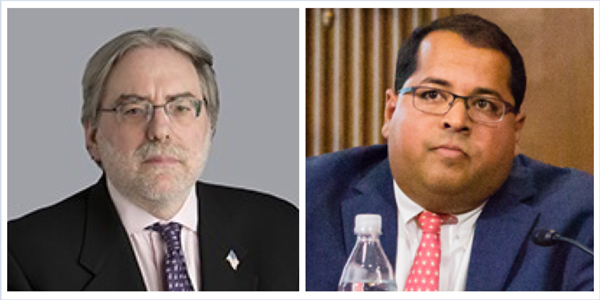By Rory D. Sweeney and Rich Heidorn Jr.
FERC Commissioner Neil Chatterjee says a former FERC general counsel attempted to privately lobby him last week in a proceeding for which he appeared to have prior knowledge of a pending order.
Chatterjee reported the ex parte communication by Gibson Dunn attorney William S. Scherman in a memo filed in the docket Friday, shortly before the commission rejected FirstEnergy’s request to transfer ownership of a struggling coal-fired merchant generator to a regulated affiliate (EC17-88).
FirstEnergy merchant affiliate Allegheny Energy Supply had requested permission to transfer ownership of the 1,159-MW Pleasants Power Station to regulated affiliate Monongahela Power, with the latter assuming a $142 million obligation for pollution controls Allegheny installed at the plant. The commission’s unanimous Jan. 12 order concluded the deal was not in the public interest because it resulted from an “overly narrow” solicitation. (See FERC Blocks FirstEnergy Sale of Merchant Plant to Affiliate.)
Chatterjee reported that Scherman called him on Jan. 11, “indicating his concern that the commission would shortly issue an order adverse to the interests of Monongahela Power. Mr. Scherman also stated that he would prefer that the commission set the issue for hearing instead of issue an adverse order. As soon as I realized that Mr. Scherman’s communication concerned the merits of the contested proceeding, I terminated the communication and did not respond to Mr. Scherman’s statements. I then drafted this memorandum to memorialize the ex parte communication for the record.”
FirstEnergy spokesman Todd Myers declined to answer questions about the incident, referring a reporter to Scherman.
Scherman insisted Tuesday that he had done nothing wrong and said the commission should change its ex parte (on one side only) rules, which prohibit private communications with commissioners in contested case specific proceedings.
“Based upon my experience, I do not believe I engaged in any ex parte communications,” Scherman said in an email to RTO Insider. “But as I wrote about nearly three years ago [in a commentary published in The Energy Daily], and as this and other episodes over the years have shown, the ex parte rules are mostly gray, difficult to enforce, and serve to cut off federal and state commissioners from vital information. The time has come to revise the rules.”
Scherman also had kind words for Chatterjee.
“In the 30 years I have been involved with FERC, I have known almost every FERC commissioner,” he said. “Based upon his short time at FERC, it is apparent to me that Neal [sic] Chatterjee will be one of the finest members the commission will ever have. He is thoughtful and dedicated to doing what is right for the American people. He is a great American.”
Commissioners Cheryl LaFleur, Robert Powelson, and Richard Glick said they had not been contacted by Scherman. Chairman Kevin McIntyre did not immediately respond to a query about whether Scherman had attempted to contact him.
Scherman, who chairs Gibson Dunn’s Energy, Regulation, and Litigation practice group, served as FERC’s general counsel, chief of staff, and senior legal and policy advisor between 1987 and 1993. He joined Gibson Dunn in 2013 after 20 years as a partner at Skadden Arps.
Scherman and his firm were not listed as representing FirstEnergy in the Pleasants Power Station proceeding. However, Scherman submitted FirstEnergy’s comments in response to the Department of Energy’s proposed rulemaking to benefit coal and nuclear plants last October (RM18-1). He also has represented the utility in proceedings before the West Virginia Public Service Commission in 2012.
A pugnacious litigator, Scherman has been a vocal critic of FERC’s enforcement officials since leaving the agency, making his case in congressional testimony, a law review article, a Wall Street Journal op-ed, and a National Association of Regulatory Utility Commissioners conference. Senate Republicans quoted from his critique during the 2014 confirmation hearings for former FERC Commissioner and Enforcement Director Norman Bay. (See FERC Enforcement Process Under Fire in House Hearing.)
In his Energy Daily commentary, written with Gibson Dunn associate Jennifer C. Mansh, Scherman conceded the need for prohibiting ex parte communications in contested legal proceedings. “Prohibitions on ex parte communications are meant to protect litigants from secret discussions and perceptions of unfairness,” they wrote. “It isn’t fair, for example, for a plaintiff to communicate alone with the judge, without any record of what was said and without allowing the defendant to respond.”
However, they said the situation is different for FERC, which “is simultaneously acting in an adjudicatory and rulemaking capacity.”
“Topics in contested proceedings frequently overlap with major public policy issues before the commission. FERC’s ex parte rules thus often prohibit the people who have the best information available from sharing highly relevant information with decision-makers,” they said.
Although FERC bars ex parte communications in case-specific, contested proceedings (18 CFR 385.2201(a), (b), (c)(1)(i)) the rules do not apply in rulemakings (18 CFR 385.2201(a), (b), (c)(1)(ii)), according to the commission.
Scherman and Mansh also wrote that FERC’s ex parte rules “are unfair to investigation targets and hinder the settlement of FERC enforcement cases.”





